Why Nations Fail Illustrated
Lecture 11
Origins of Inclusive Institutions
in the 20th century
December 18, 2018
Masayuki Kudamatsu
Chapter 14 and pp. 455-457

Today's Road Map
Botswana
US South in the 1960s
Brazil since 1978

Today's Road Map
Botswana
US South in the 1960s
Brazil since 1978
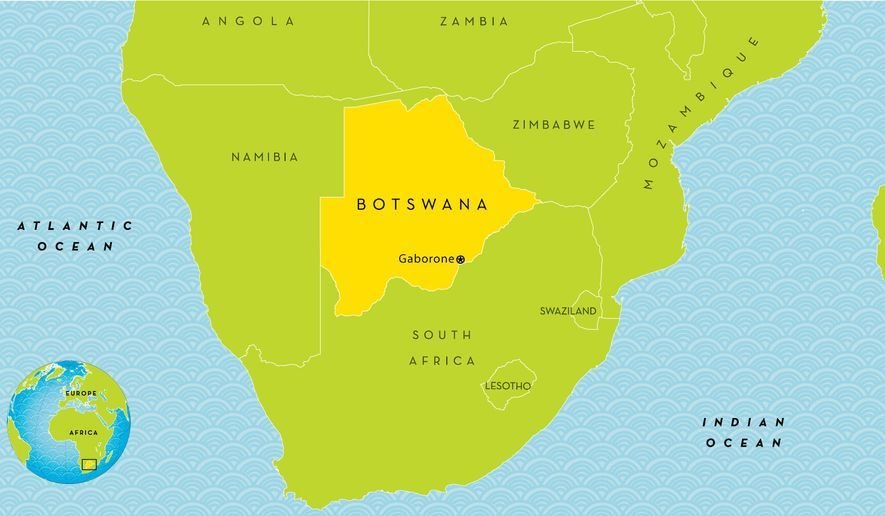
Image Source: Washington Post
Precolonial Botswana
By 19th century, pluralistic institutions were formed
"Kgotla" (general assembly of adult males)
Frequently held
Topics discussed:
tribal disputes
new taxes
new public works
Chief's wishes can be overruled
Anyone may speak
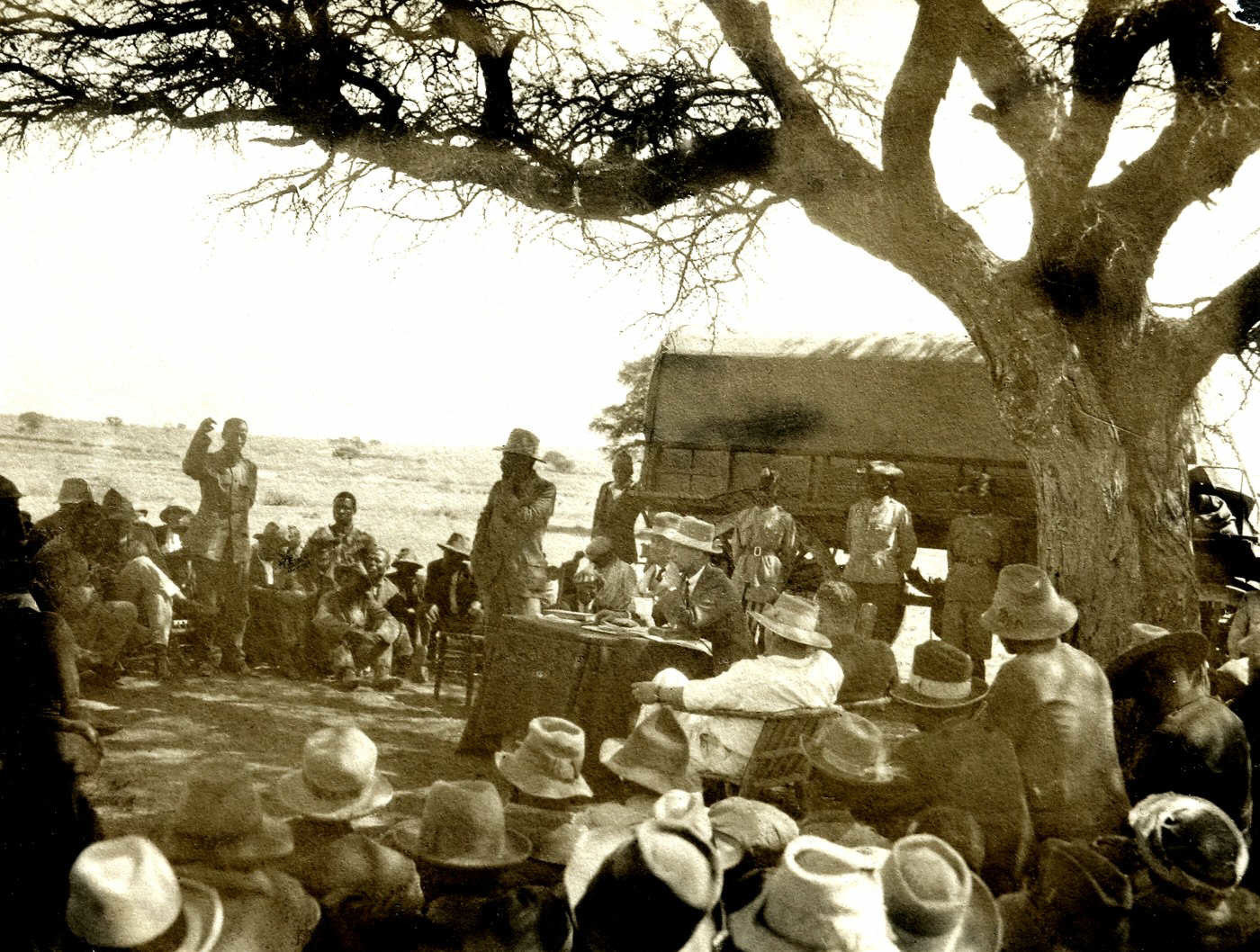
Image Source: Under African Skies
Chieftaincy: not strictly hereditary
Open to any man demonstrating significant talent & ability
British colonization of Botswana
1885
Becomes a British protectorate
But Britain has no interest in resource extraction etc.
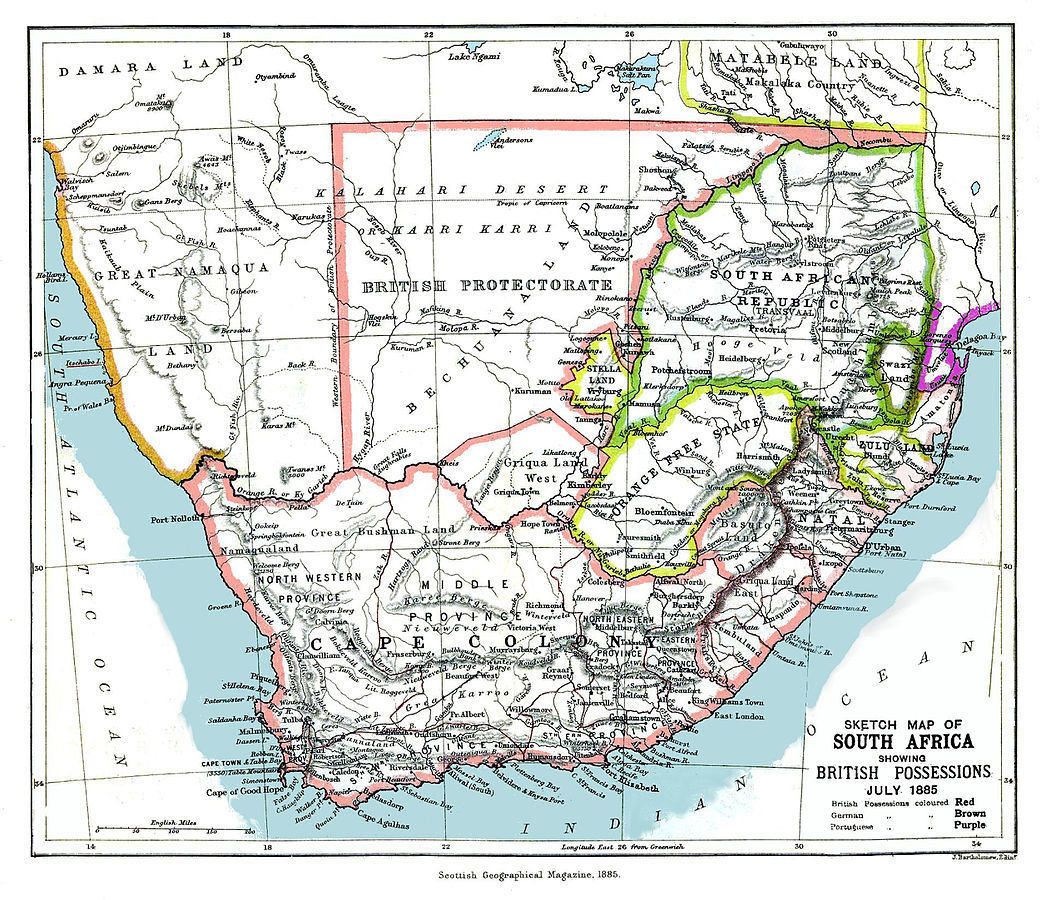
1885 Map showing British possessions
Image Source: Wikimedia Commons
British colonization of Botswana (cont.)
1895
Three Tswana chiefs visited Britain
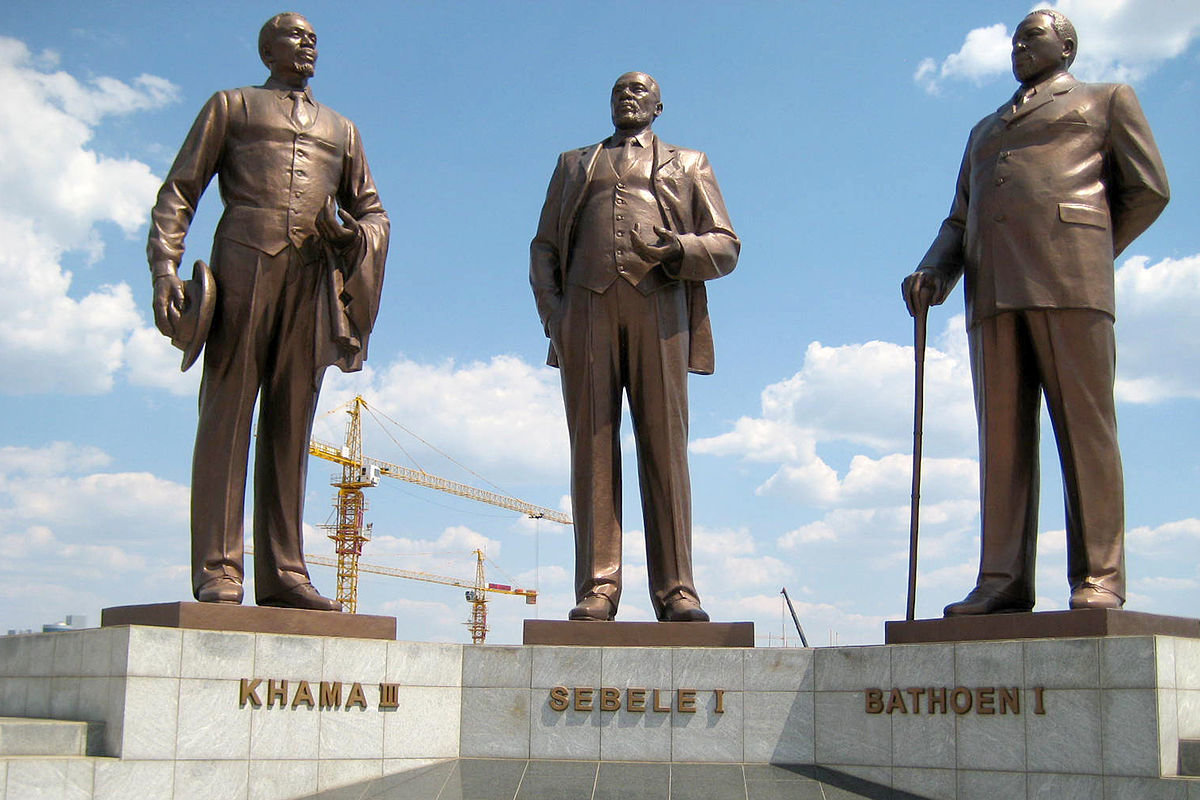
Image Source: Wikimedia Commons
Their request accepted by British government
Request British govt
to protect them from Rhodes
Tour around Britain
to gather popular support
1889
Cecil Rhodes started colonizing Rhodesia (Zimbabwe/Zambia)
Colonial Botswana (1895-1966)
Escape the indirect rule of Britain like in Sierra Leone (Lecture 9)
Avoid the establishment of apartheid like in South Africa (Lecture 8)
But the colonial rule prevented innovation
Quett Masire (who would later become president in 1980)
Developed new cultivation techniques for sorghum in the 1950s
e.g.
Found a potential customer in South Africa
But couldn't use the British railway connecting Botswana and South Africa
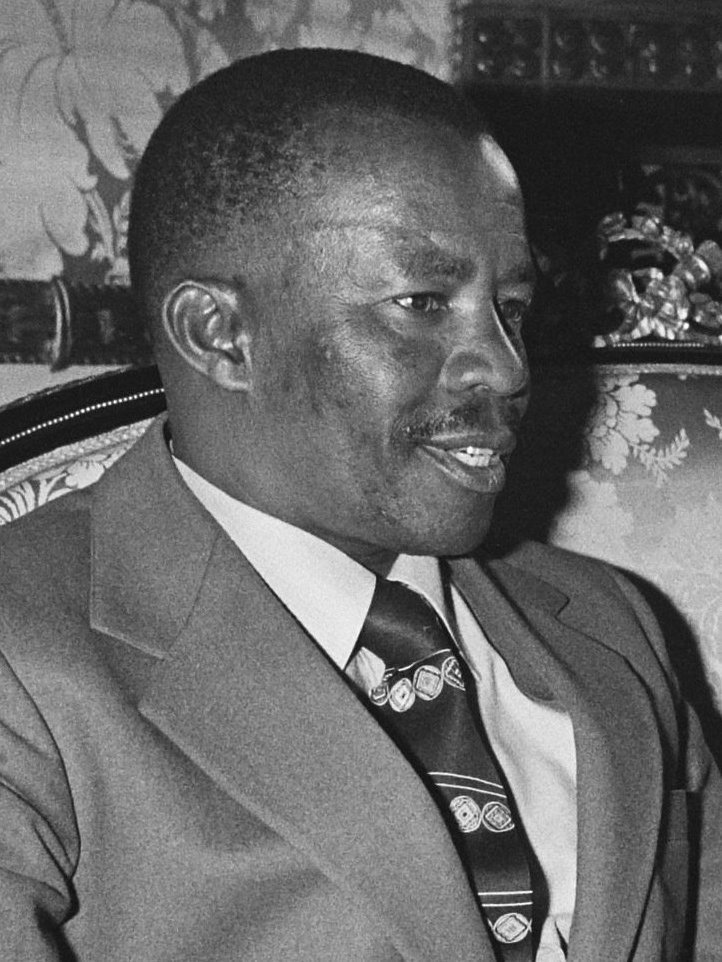
Image Source: Wikimedia Commons
Botswana after independence (since 1966)
Centralization
Chieftaincy Amendment Act of 1970
Remove the right to allocate land from chiefs
cf. Sierra Leone (Lecture 9)
Only Setswana and English taught in school
1946 census shows large ethnic heterogeneity
Today there is no ethnic/linguistic fragmentation
(Census never asks ethnicity since independence)
Plurality
Most of the Tswana chiefs and elites:
join the ruling Botswana Democratic Party (BDP)
Multiparty democracy ever since independence
Inclusive
Extractive
Both
Plurality
and
Centralized
State
Either
Absolutist
or
Lack of
Centralization
That is...
Botswana after independence (since 1966) (cont.)
Coalition in favour of secure property rights
Elites own cattle (major assets in the economy)
(Land: held communally)
Cattle: historically owned as private property
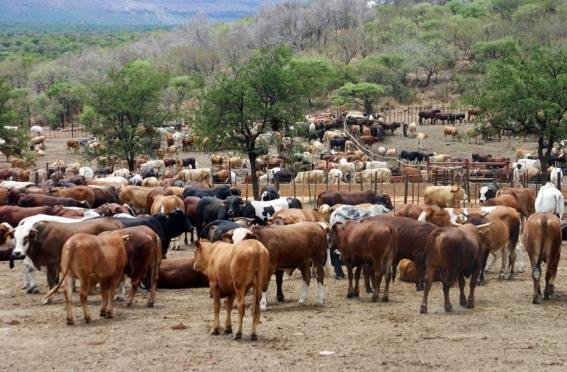
Image Source: Sunday Standard
| economic institutions | ||
|---|---|---|
| Secure for everyone |
Property rights | Insecure for majority of people |
| Free | Occupational choice |
Forced labor |
| Free | Entry of new businesses | Prevented by monopolies |
| Unbiased | System of laws | Biased for the powerful/rich |
| Promoted | Public service provision | Discouraged |
Economic Institutions
Inclusive
Extractive
Property rights
Secure for everyone
Insecure for
majority of people
Occupational choice
Free
Forced labor
Entry of
new businesses
Free
Prevented by
monopolies
System of laws
Unbiased
Biased for
the powerful / rich
Public service provision
Provided
Limited
That is...
Botswana after independence (since 1966) (cont.)
Botswana Meat Commission
(marketing board)
Promote export
Control foot-and-mouth disease
Set up by BDP in 1967
cf. Marketing boards in Sierra Leone (Lecture 9)

| economic institutions | ||
|---|---|---|
| Secure for everyone |
Property rights | Insecure for majority of people |
| Free | Occupational choice |
Forced labor |
| Free | Entry of new businesses | Prevented by monopolies |
| Unbiased | System of laws | Biased for the powerful/rich |
| Promoted | Public service provision | Discouraged |
Economic Institutions
Inclusive
Extractive
Property rights
Secure for everyone
Insecure for
majority of people
Occupational choice
Free
Forced labor
Entry of
new businesses
Free
Prevented by
monopolies
System of laws
Unbiased
Biased for
the powerful / rich
Public service provision
Provided
Limited
That is...
Botswana after independence (since 1966) (cont.)
Discovery of diamonds in 1972
Govt passes a law to make
all subsoil mineral rights vested in the nation, not the tribe
Diamond revenues
used for state building, infrastructure, education
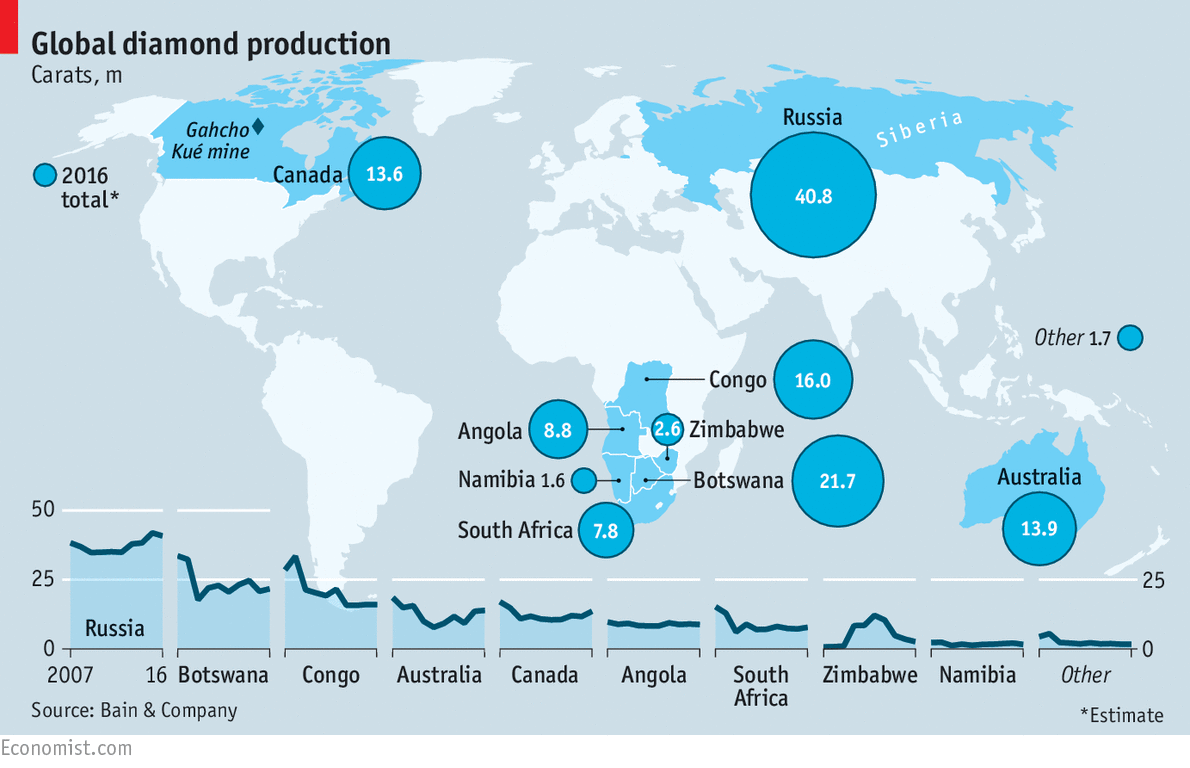
Image Source: The Economist
| economic institutions | ||
|---|---|---|
| Secure for everyone |
Property rights | Insecure for majority of people |
| Free | Occupational choice |
Forced labor |
| Free | Entry of new businesses | Prevented by monopolies |
| Unbiased | System of laws | Biased for the powerful/rich |
| Promoted | Public service provision | Discouraged |
Economic Institutions
Inclusive
Extractive
Property rights
Secure for everyone
Insecure for
majority of people
Occupational choice
Free
Forced labor
Entry of
new businesses
Free
Prevented by
monopolies
System of laws
Unbiased
Biased for
the powerful / rich
Public service provision
Provided
Limited
That is...
Consequences
among the poorest in the world
12km of paved roads
22 college graduates
100 secondary school graduates

Source: World Development Indicators
highest per capita income in Africa
GDP per capita (constant 2010 US$)
At independence
Now

Today's Road Map
Botswana
US South in the 1960s
Brazil since 1978
Extractive institutions in US South until 1950s
Politically:
Former slaves de facto disenfranchised
poll tax and literacy test (Lecture 9)
Economically:
Former slaves forced to work for plantation owners
Black Code (Lecture 9)
Former slaves: better organized to protest
Reasons for institutional change in the 1950s
1
2
3
U.S. Federal court and legislation intervenes
Plantation based on manual labor: outdated
Former slaves: better organized to protest
Montgomery Bus Boycott (1955-56)
By law of Montgomery, Alabama, bus seats were segregated by race
Rose Parks (civil rights activist):
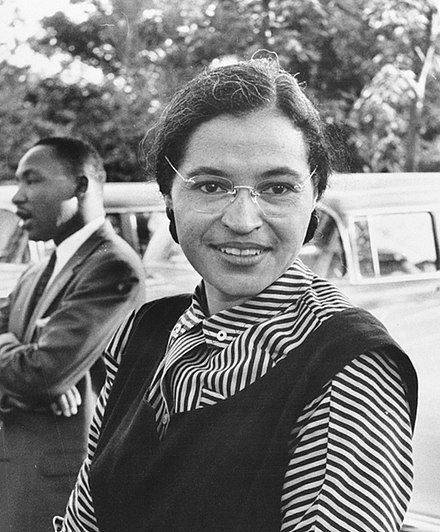
Arrested for sitting in a bus seat reserved for whites
Black people boycotted any bus ride in Montgomery for a year
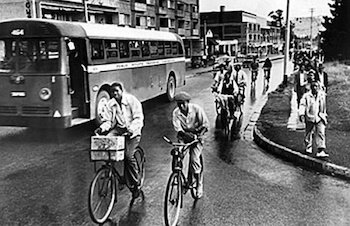
Source: Wikimedia Commons
Source: African American Registry
U.S. Federal Supreme Court intervenes
U.S. South institutions were ruled as unconstitutional:
Segregation of schools by race (Lecture 9)
Segregation of bus seats by race
in response to Montgomery Bus Boycott
Legislative malapportionment
Rural areas (dominated by plantation owners) were overrepresented in legislature
Federal court rulings were actually enforced
Federal court ruling in 1962:
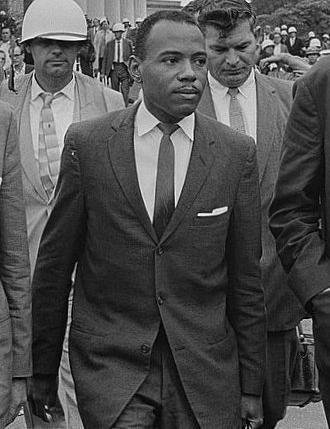
James Meredith, a young black air force veteran
must be admitted to University of Mississippi
Citizens' Councils, white supremacist groups,
organize protests

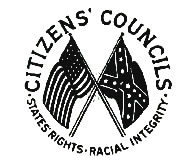
State governor Ross Barnett
publicly rejects the ruling
Federal court rulings were enforced (cont.)
On September 30, 1962
U.S. marshals brought Meredith to the campus
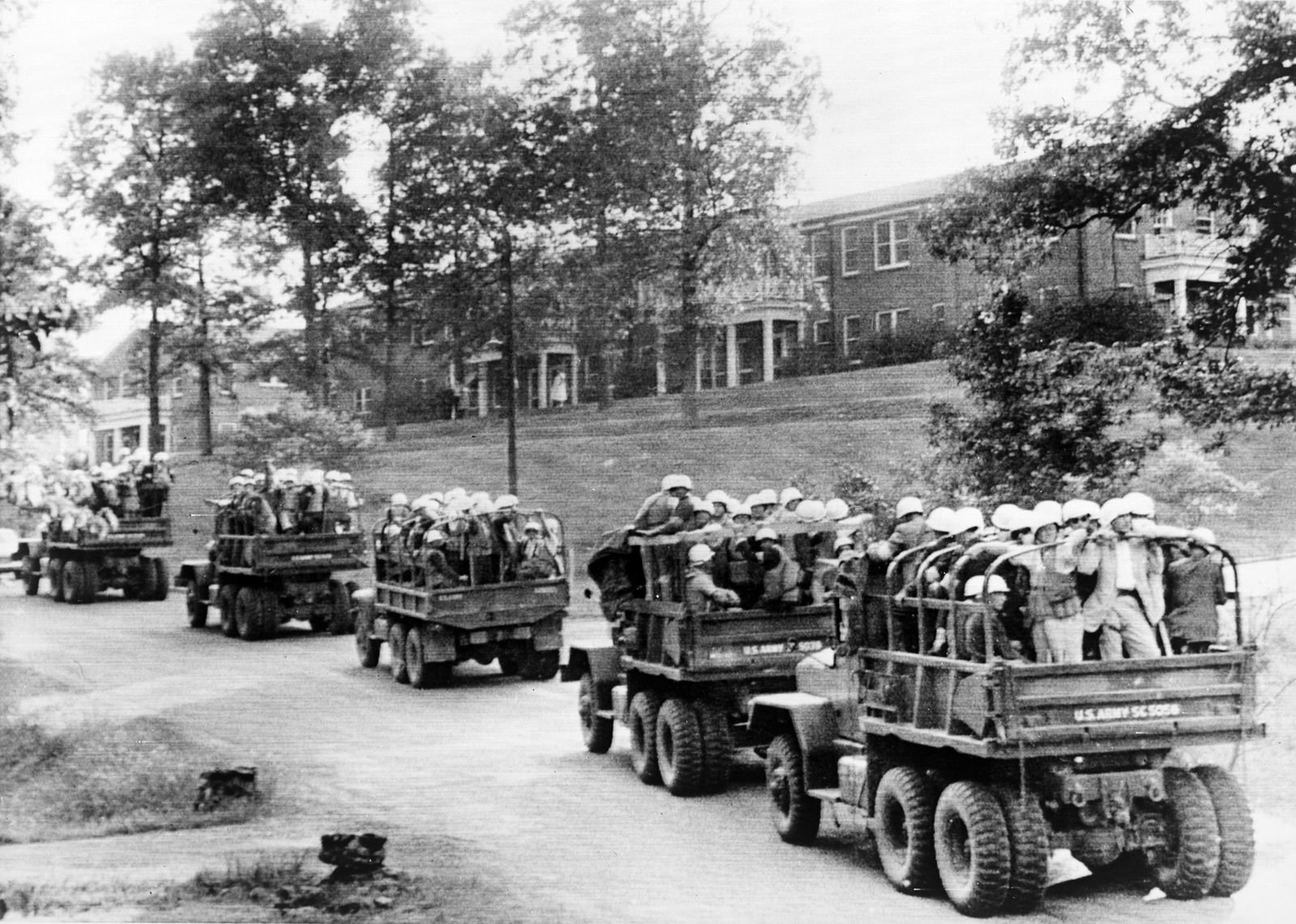
Source: Wikimedia Commons
U.S. Federal Congress intervenes
Civil Rights Act of 1964
Outlaws all segregationist state legislation & practices
Voting Rights Act of 1965
Bans literacy tests, poll taxes, & any other methods to disenfranchise voters
Plantation based on manual labor: outdated
(1) Mass outmigration of blacks from the South
100,000 per year
in 1940s & 1950s

Source: U.S. Census Bureau
Image source: Wikimedia Commons
Harder for the elite to force blacks to work for plantation
Plantation based on manual labor: outdated (cont.)
(2) Mechanization of cotton production
By 1960, half of production had become mechanized
In 1950, almost all cotton was still hand-picked
No reason for US South elite
to vigorously fight for maintaining extractive institutions
(1) Mass outmigration of blacks from the South
Consequences
Inclusive political institutions
Voter turnout for blacks
Mississippi
Alabama & South Carolina
5%
10%
50%
50%
1960
1970
Consequences (cont.)
Inclusive economic institutions
% of black employees in textile mills
5% in 1960
15% in 1970
25% in 1990
| economic institutions | ||
|---|---|---|
| Secure for everyone |
Property rights | Insecure for majority of people |
| Free | Occupational choice |
Forced labor |
| Free | Entry of new businesses | Prevented by monopolies |
| Unbiased | System of laws | Biased for the powerful/rich |
| Promoted | Public service provision | Discouraged |
Economic Institutions
Inclusive
Extractive
Property rights
Secure for everyone
Insecure for
majority of people
Occupational choice
Free
Forced labor
Entry of
new businesses
Free
Prevented by
monopolies
System of laws
Unbiased
Biased for
the powerful / rich
Public service provision
Provided
Limited
That is...
Consequences (cont.)
Economic growth
Per capita income in southern states
50% of the national average in 1940
The gap vanished by 1990

Today's Road Map
Botswana
US South in the 1960s
Brazil since 1978
Brazil until 1970s
Military dictatorship (1964-1985)

Source: Wikipedia
Income inequality: among the world's largest
Emergence of inclusive institutions in Brazil

Workers' Party led by Luiz Inacio Lula da Silva
1979
Founded as a broad coalition of citizens
Opposition politicians
Labor union leaders
Students
Intellectuals
100 diverse social movements across Brazil
1982
Wins two mayoral elections
1988
Controls 36 municipal govts (incl. Sao Paulo)
1989
Lula wins 44% of votes in presidential election run-off
Lula wins the presidential election
2002
Emergence of inclusive institutions in Brazil (cont.)
Introduced by Workers' Party in 1988
Ordinary citizens:
take part in formulating priorities of city govt spendings
Becomes a world model for local govt accountability
Public service provision improved as a result (Goncalves 2014)
Investment in sanitation and health
Infant mortality
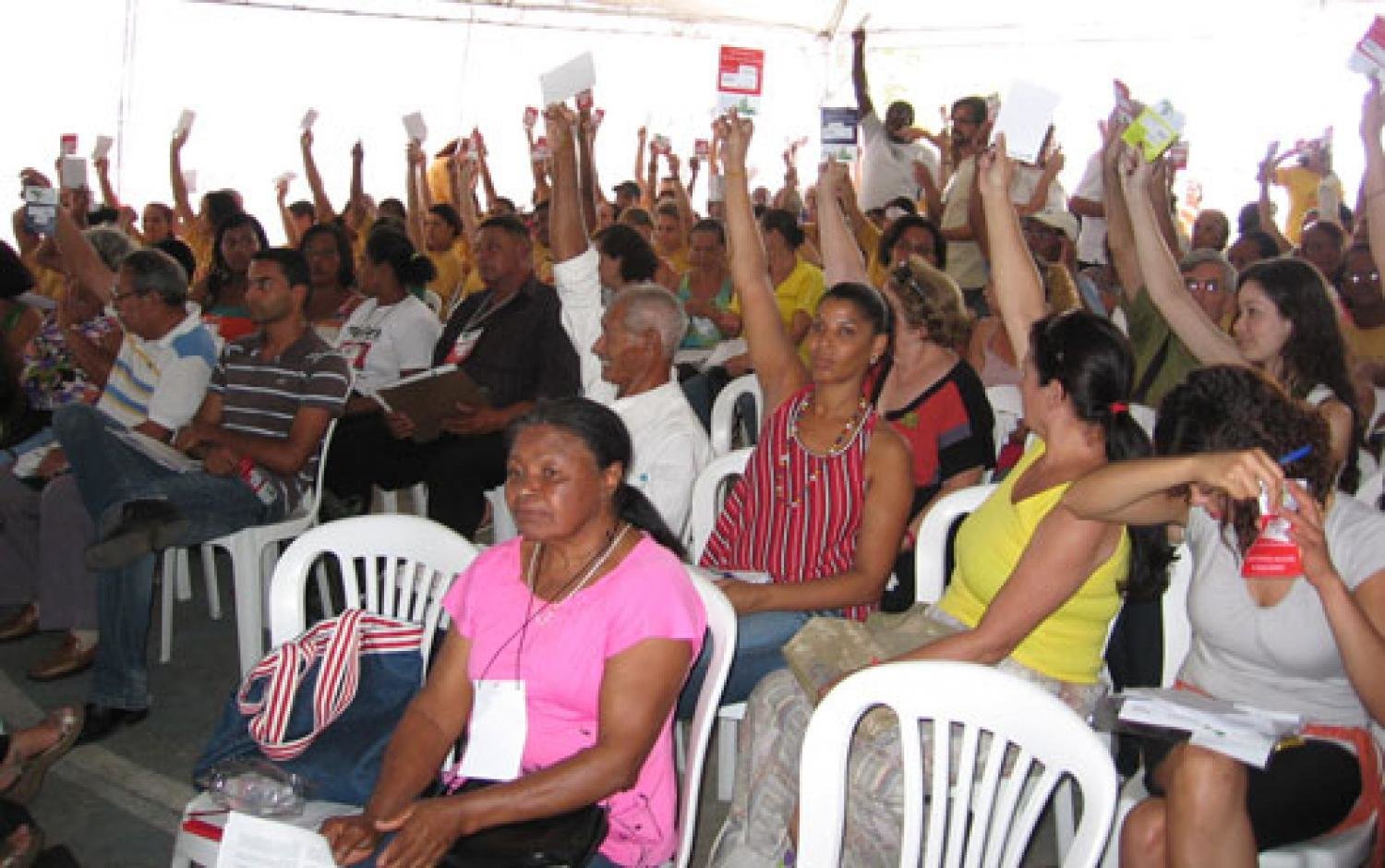
Image Source: Occupy.com
Consequences
Rapid economic growth & falling income inequality since 1990
% of population in poverty
45% in 1990
30% in 2006
Average years of schooling
6 years in 1995
8 years in 2006
Week 13
Chapter 6
Week 11
Chapter 14
United Kingdom
in 19c
United States
in early 20c
Republic of Venice
Roman Republic
Weeks 11-13: Survival of Inclusive Institutions
Botswana
US South
in the 1950s-1960s
Brazil
since the 1970s
Week 12
Chapter 11
Next week
Your to-do list until next class
Read Chapter 11 along with
pp. 364-365 (a summary)
and post questions on Prulu
1
2
3
Start collecting documents on political/economic events in your country
Write the 1st draft of your term paper